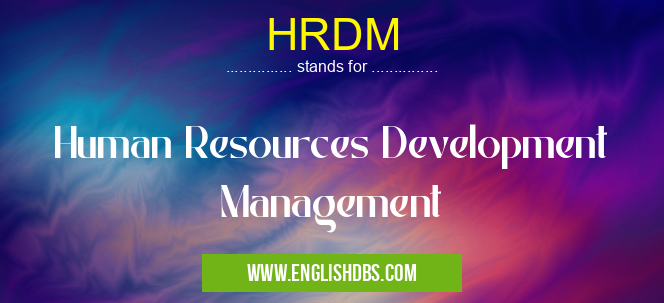What does HRDM mean in DEVELOPMENT
HRDM stands for Human Resources Development Management. It is a specialized field within human resources that focuses on the development and management of an organization's human capital. HRDM professionals are responsible for creating and implementing strategies that enable employees to reach their full potential and contribute to the organization's success.

HRDM meaning in Development in Community
HRDM mostly used in an acronym Development in Category Community that means Human Resources Development Management
Shorthand: HRDM,
Full Form: Human Resources Development Management
For more information of "Human Resources Development Management", see the section below.
» Community » Development
Key Responsibilities of HRDM Professionals
- Talent Acquisition and Management: Identifying, attracting, and selecting high-performing employees.
- Performance Management: Setting performance goals, providing feedback, and recognizing employee achievements.
- Training and Development: Designing and delivering training programs to enhance employee skills and knowledge.
- Career Development: Helping employees identify and pursue career paths within the organization.
- Succession Planning: Identifying and developing potential leaders to ensure a smooth transition during organizational changes.
- Compensation and Benefits: Developing and managing compensation and benefits packages to attract and retain talent.
- Employee Relations: Managing employee relations, including resolving conflicts and addressing grievances.
Benefits of Effective HRDM
- Increased Employee Engagement: HRDM strategies enhance employee satisfaction and motivation, leading to higher engagement levels.
- Improved Productivity: Skilled and motivated employees are more productive, resulting in increased organizational performance.
- Reduced Turnover: Effective HRDM programs help attract and retain top talent, reducing turnover costs.
- Innovation and Adaptability: HRDM fosters a culture of learning and development, allowing employees to adapt to changing business needs and contribute to innovation.
- Enhanced Employer Brand: Well-managed HRDM practices create a positive employer brand, attracting high-quality candidates.
Essential Questions and Answers on Human Resources Development Management in "COMMUNITY»DEVELOPMENT"
What is HRDM?
Human Resources Development Management (HRDM) involves planning, implementing, evaluating, and managing organizational learning and development initiatives to improve employee performance and achieve business goals.
What are the key responsibilities of an HRDM professional?
HRDM professionals are responsible for designing and delivering training programs, assessing employee learning needs, facilitating professional development opportunities, and evaluating the impact of HRD initiatives on organizational performance.
What are the benefits of HRDM for organizations?
HRDM benefits organizations by enhancing employee skills, fostering innovation, increasing productivity, improving employee motivation and retention, and supporting organizational growth and adaptation to changing business environments.
What are the core principles of HRDM?
Core principles of HRDM include aligning learning and development to business objectives, empowering employees to take ownership of their professional growth, creating a culture of continuous learning, and evaluating and measuring the impact of HRD initiatives.
What are some emerging trends in HRDM?
Emerging trends in HRDM include the use of technology for personalized learning experiences, blended learning approaches that combine online and in-person training, the focus on social and emotional learning, and the integration of diversity, equity, and inclusion principles into HRD programs.
What are the qualifications and skills required for an HRDM professional?
HRDM professionals typically possess a bachelor's or master's degree in Human Resources, Organizational Development, or a related field. They also require strong communication, interpersonal, and analytical skills, as well as a deep understanding of organizational learning and development principles.
What is the difference between HRDM and other HR functions?
HRDM focuses specifically on employee development and learning, while other HR functions, such as recruitment, performance management, and compensation, handle different aspects of the employee lifecycle. However, HRDM collaborates with these other HR functions to ensure a comprehensive and aligned HR strategy.
Final Words: HRDM is a crucial function in modern organizations, enabling them to maximize the potential of their human capital. By implementing effective HRDM strategies, organizations can attract, develop, and retain a skilled and motivated workforce that drives success and innovation.
HRDM also stands for: |
|
| All stands for HRDM |
